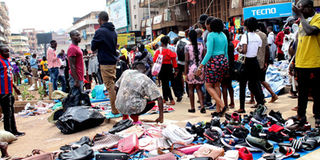Youth defying the Karl Marx philosophy

Youths walking past merchandise being sold on streets of 'Down town' Kampala. PHOTO/FILE
What you need to know:
- The new class of landless youths creates its own dynamics, which is new to Uganda and will be the driver of major socio-economic and political change over the next few years.
Karl Marx considered peasants a non-revolutionary class. In his view, before peasants would challenge the status quo, they would first have to be “liberated from their land”. Marx saw this “liberation” come about through industrialization.
Factories would employ peasants thus creating a revolutionary class of workers.
The same holds true for African subsistence farmers.
The presence of such a non-revolutionary class of farmers has been the most important factor allowing the decades-long rule of many African leaders.
However, things are changing in a way Marx could not have anticipated. The “liberation” of farmers from their land is taking place before our very eyes. When I was standing in front of Parliament in 1986, watching President Museveni assume power, there were 15 million Ugandans.
Last year, we stood at more than 44 million. Because of the steep population increase, fathers no longer have land to give out to their children. This circumstance has “liberated”, in a Marxist sense, the current generation of youths from their land.
Millions of youths are now holed up in trading centres looking for employment as boda boda cyclists, labourers, brick makers, and hustlers. Or simply as idlers, which has now become a serious occupation in its own right.
The new class of landless youths creates its own dynamics, which is new to Uganda and will be the driver of major socio-economic and political change over the next few years.
I am slightly apprehensive about this process given Uganda’s past experience with change.
Joseph van Eijndhoven MSc,
[email protected].




